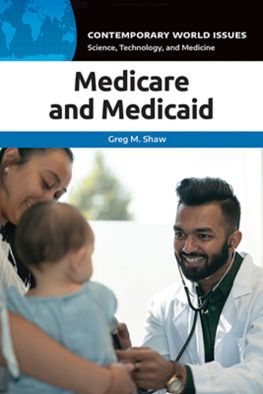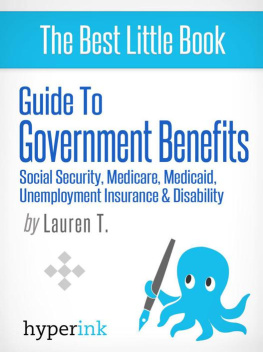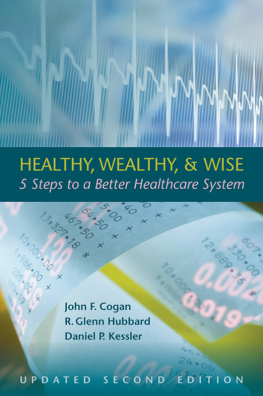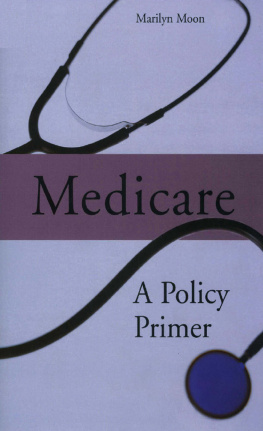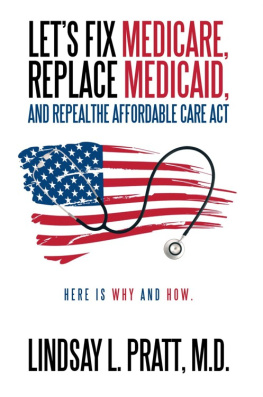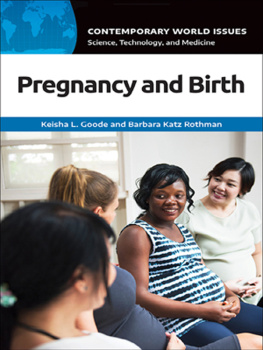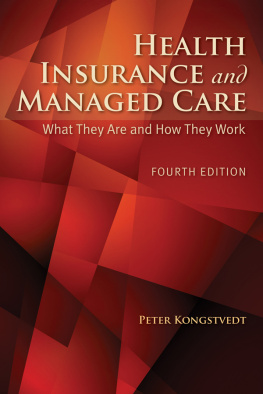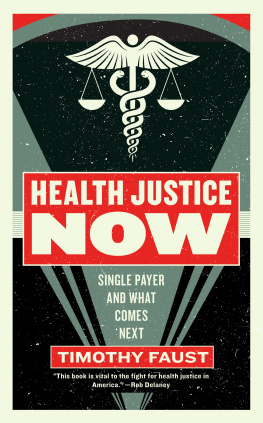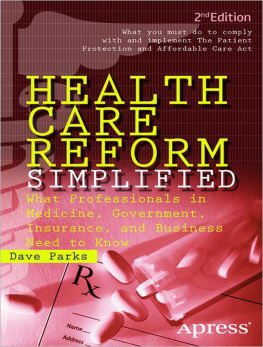Medicare and Medicaid
Recent Titles in the
CONTEMPORARY WORLD ISSUES
Series
Bullying: A Reference Handbook
Jessie Klein
Domestic Violence and Abuse: A Reference Handbook
Laura L. Finley
Torture and Enhanced Interrogation: A Reference Handbook
Christina Ann-Marie DiEdoardo
Racism in America: A Reference Handbook
Steven L. Foy
Waste Management: A Reference Handbook
David E. Newton
Sexual Harassment: A Reference Handbook
Merril D. Smith
The Climate Change Debate: A Reference Handbook
David E. Newton
Voting Rights in America: A Reference Handbook
Richard A. Glenn and Kyle L. Kreider
Modern Slavery: A Reference Handbook
Christina G. Villegas
Books in the Contemporary World Issues series address vital issues in todays society such as genetic engineering, pollution, and biodiversity. Written by professional writers, scholars, and nonacademic experts, these books are authoritative, clearly written, up-to-date, and objective. They provide a good starting point for research by high school and college students, scholars, and general readers as well as by legislators, businesspeople, activists, and others.
Each book, carefully organized and easy to use, contains an overview of the subject, a detailed chronology, biographical sketches, facts and data and/or documents and other primary source material, a forum of authoritative perspective essays, annotated lists of print and nonprint resources, and an index.
Readers of books in the Contemporary World Issues series will find the information they need in order to have a better understanding of the social, political, environmental, and economic issues facing the world today.
Copyright 2021 by ABC-CLIO, LLC
All rights reserved. No part of this publication may be reproduced, stored in a retrieval system, or transmitted, in any form or by any means, electronic, mechanical, photocopying, recording, or otherwise, except for the inclusion of brief quotations in a review, without prior permission in writing from the publisher.
Library of Congress Cataloging-in-Publication Data
Names: Shaw, Greg M., author.
Title: Medicare and medicaid : a reference handbook / Greg M. Shaw.
Description: Santa Barbara : ABC-CLIO, 2021. | Series: Contemporary world issues | Includes bibliographical references and index.
Identifiers: LCCN 2020024080 (print) | LCCN 2020024081 (ebook) | ISBN 9781440873348 (hardcover) | ISBN 9781440873355 (ebook)
Subjects: LCSH: Medicare. | Medicaid. | Social medicineUnited States.
Classification: LCC RA412.3 .S534 2021 (print) | LCC RA412.3 (ebook) | DDC 368.4/2600973dc23
LC record available at https://lccn.loc.gov/2020024080
LC ebook record available at https://lccn.loc.gov/2020024081
ISBN: 978-1-4408-7334-8 (print)
978-1-4408-7335-5 (ebook)
25 24 23 22 21 1 2 3 4 5
This book is also available as an eBook.
ABC-CLIO
An Imprint of ABC-CLIO, LLC
ABC-CLIO, LLC
147 Castilian Drive
Santa Barbara, California 93117
www.abc-clio.com
This book is printed on acid-free paper 
Manufactured in the United States of America
Contents
To the great extent Americans are ambivalent about government involvement in health care, a balanced account of health policy in the United States might begin like Charles Dickens 1859 novel A Tale of Two Cities. It was the best of times, it was the worst of times, it was the age of wisdom, it was the age of foolishness. Americans currently live during a time of remarkable technological advances in medicine that have rendered many debilitating or fatal conditions as relics of the past. Joint replacements and organ transplants have become essentially routine. American babies born as much as 10 weeks prematurely usually survive. The last wild case of polio was seen in the United States in 1979, before most Americans alive today were born. The survival rates for most types of cancer are higher than they have ever been.
However, Americans also spend far more on health care than people in any other country, and the United Sates spends a larger share of its overall wealth on these services than does any other nation. Despite this, the United States has only mediocre public health statistics to show for it. The American infant mortality rate places the United States behind most industrialized democracies. The same can be said about the rate of mortality amenable to health care, that is, the number of deaths that could be avoided with proper health care services. The politics surrounding health care is so conflicted that majorities of Americans not only support increased government spending on health but also disapprove of many of the recent proposals to extend insurance to more of the population. Medicaid has become the nations primary way of paying for nursing home care, yet about one-quarter of the states have declined (as of 2020), on a partisan basis, to expand that program to cover more near-poor residents despite Congresss offer to pay 90 percent of the additional costs. Barely one-half of American adults hold a favorable view of the Affordable Care Act, yet neither political party has been able to muster the votes in Congress to significantly adapt the law to an ever-evolving health insurance landscape, other than to eliminate the controversial requirement that virtually all Americans should obtain health insurance and to delay the implementation of the tax on high-cost private insurance plans. Public opinion polls routinely show that most Americans believe government should do more to expand health insurance, but calls for Medicare for All receive distinctly mixed responses. Observers might be forgiven for concluding that Americans really dont know what they want in the way of health care policy.
That this book went to press during the worst pandemic in a century tragically added several other layers of importance to this conversation. In the view of many public health professionals, the U.S. health care system, as piecemeal as it is, was not particularly prepared for the onslaught of patients the COVID-19 virus has created. Not only should clinic and hospital staff not have to worry about shortages of things as basic as personal protective equipment, the insufficiency of intensive care beds and ventilators further highlighted the work to be done in order to create a world-class health care system. Beyond the equipment shortages, three other elements have stood out. First, the 9.1 percent of Americans who lack health insurance (as of early 2019) poses significant challenges not only for these nearly 30 million people who dont know how they would pay for services if the virus befell them but also for their medical providers. While the vast majority of providers want to be able to service all comers, the costs that will be passed on to those who are insured will be tremendous. Second, COVID-19s disproportionate impact on less healthy persons has revealed how some of these co-morbidities, especially respiratory problems, are structured by race and class. To date, African Americans have suffered illness and death from the virus at a significantly higher rate than other groups. That they also account for more than their share of the uninsured population creates a recipe for outsized impacts. Finally, the dysfunction of many parts of Americans health care discourse showed itself again during the spring of 2020 when a strong partisan divide emerged on questions of the severity of the pandemic and whether or not people should take it seriously, adjusting their lives accordingly. That Democrats and Republicans would resort to their party identificationdisplaying 30-to 40-percentage point spreadsto interpret a pandemic that, since spring 2020, has killed tens of thousands of Americans each month and has, as of this writing, cut short over 200,000 lives is nothing short of appalling (see the NPR/PBS/Marist poll of March 1314, 2020). While it shouldnt be necessary to have to say it, protecting public health should not be a partisan matter. But the evidence says it is.

